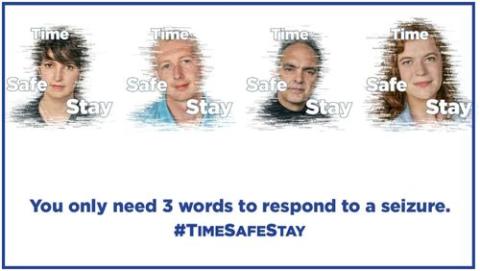
Today is International Epilepsy Day and the national patient organisation representing people with epilepsy and their families, Epilepsy Ireland, are appealing to the Irish public to learn more about Seizure First Aid and the key words of TIME, SAFE, STAY.
Explaining the new campaign, Paddy McGeoghegan, Advocacy & Communications Manager at Epilepsy Ireland said:
In devising our new campaign, we identified how millions of words have been written about epilepsy, but in reality, you just need to remember three when helping a person who is having a seizure. One of the biggest worries people with epilepsy and their families have is whether a member of the public will respond correctly should they have a seizure. This is why we want everyone to be aware of Time, Safe, Stay!
But what is meant by Time, Safe, Stay?
TIME - The first thing you should do is TIME the seizure. This is because if a seizure goes over 5 minutes, an ambulance should be called.
SAFE - Keep the person SAFE during the seizure. If a person is having a convulsive seizure, cushion their head with something soft if possible and remove any harmful objects, e.g. furniture from their vicinity. NEVER put anything in a person's mouth or restrain them during a seizure. Be aware that there are also types of seizures where the person does not experience convulsions. Instead, they may “zone out” or stare blankly, become confused or agitated, display behaviours like chewing, smacking their lips, fiddling with their clothes, or wandering aimlessly. In this type of seizure, the person’s awareness of their surroundings is affected, and it is important to gently guide the person away from any danger. As with convulsive seizures, never restrict the person’s movements.
STAY - During the seizure and after it passes, STAY with the person. Often after a seizure, a person with epilepsy will be confused and in many cases, exhausted. Make sure to stay with them until recovery is complete, explain what has happened and gently reassure them. The person may have experienced an injury if they have fallen, and if this is the case, ensure normal first aid steps are taken.
Paddy concluded:
For International Epilepsy Day 2024, we are appealing to the Irish public to please visit www.epilepsy.ie to take a moment to learn more about epilepsy and these three crucial words – it only takes five minutes and can be your good deed for the day or the week – the 45,000 people living with epilepsy in Ireland would greatly appreciate it.
ENDS
Further Information
- The main campaign landing page can be found by visiting the 'International Epilepsy Day 2024' section of our website.
- The new campaign for International Epilepsy Day features four people living with epilepsy in Ireland. You can read more about each of them by following the links below:
Read Cara's story on our website
Read Paul's story on our website
Read Lucy's story on our website
Read Wayne's story on our website - If you are a member of the media and have further questions on the campaign, please email our Advocacy & Communications Manager, Paddy McGeoghegan on pmcgeoghegan@epilepsy.ie.
About Epilepsy and Epilepsy Ireland.
Epilepsy is a neurological disorder characterised by a tendency to have recurring seizures. Over 45,000 in Ireland have epilepsy including 10,000–15,000 people who are living with uncontrolled seizures. For this group in particular, the consequences of epilepsy can be long-lasting and significant. It can affect the person’s education, employment, social functioning, self-esteem and independent living. People with epilepsy must also cope with the physical impact of seizures, the side-effects of medications and for many, the social stigma and economic impact that can be associated with it. Its individualised impact on those who live with it means that it is often considered as a hidden disability. There is also an increased risk of mortality associated with epilepsy with an estimated 130 epilepsy-related deaths in Ireland each year.
Epilepsy Ireland’s vision is to achieve a society where no person’s life is limited by epilepsy. Since 1966, we have remained committed to working for, and meeting the needs of everyone with epilepsy in Ireland, their families, and carers. As per our Strategic plan 2022 – 2026, our key aims are as follows:
- To empower people with epilepsy through support and education.
- To centre people with epilepsy and their families in the work of Epilepsy Ireland.
- To work collaboratively to improve the care of people with epilepsy and knowledge of the condition.
- To transform perceptions of epilepsy and public policy relevant to the condition.
- To increase and diversify our income streams.
- To demonstrate the highest standards of governance and ensure structures are in place to meet objectives.
Our values are RESPECT:
- Respect
- Empathy
- Support
- Person-centred
- Empowerment
- Collaboration
- Trust
Our mission is to empower all those affected by epilepsy to achieve their full potential by providing high-quality community-based support and education, raising public awareness, conducting effective advocacy, and supporting research.
For further information on epilepsy and Epilepsy Ireland, visit www.epilepsy.ie.
About International Epilepsy Day
International Epilepsy Day, a joint initiative created by the International Bureau for Epilepsy (IBE) and the International League Against Epilepsy (ILAE), is a global event celebrated annually on the 2nd Monday of February, to promote awareness on epilepsy right around the world. With IBE and ILAE representation in more than 140 countries, this is a powerful opportunity to highlight the problems faced by people with epilepsy, their families and carers, in every region of the world. As the national patient organisation representing people with epilepsy and their families in Ireland, Epilepsy Ireland lead the activities on the day here to educate the public on a condition that affects over 45,000 people in Ireland.
